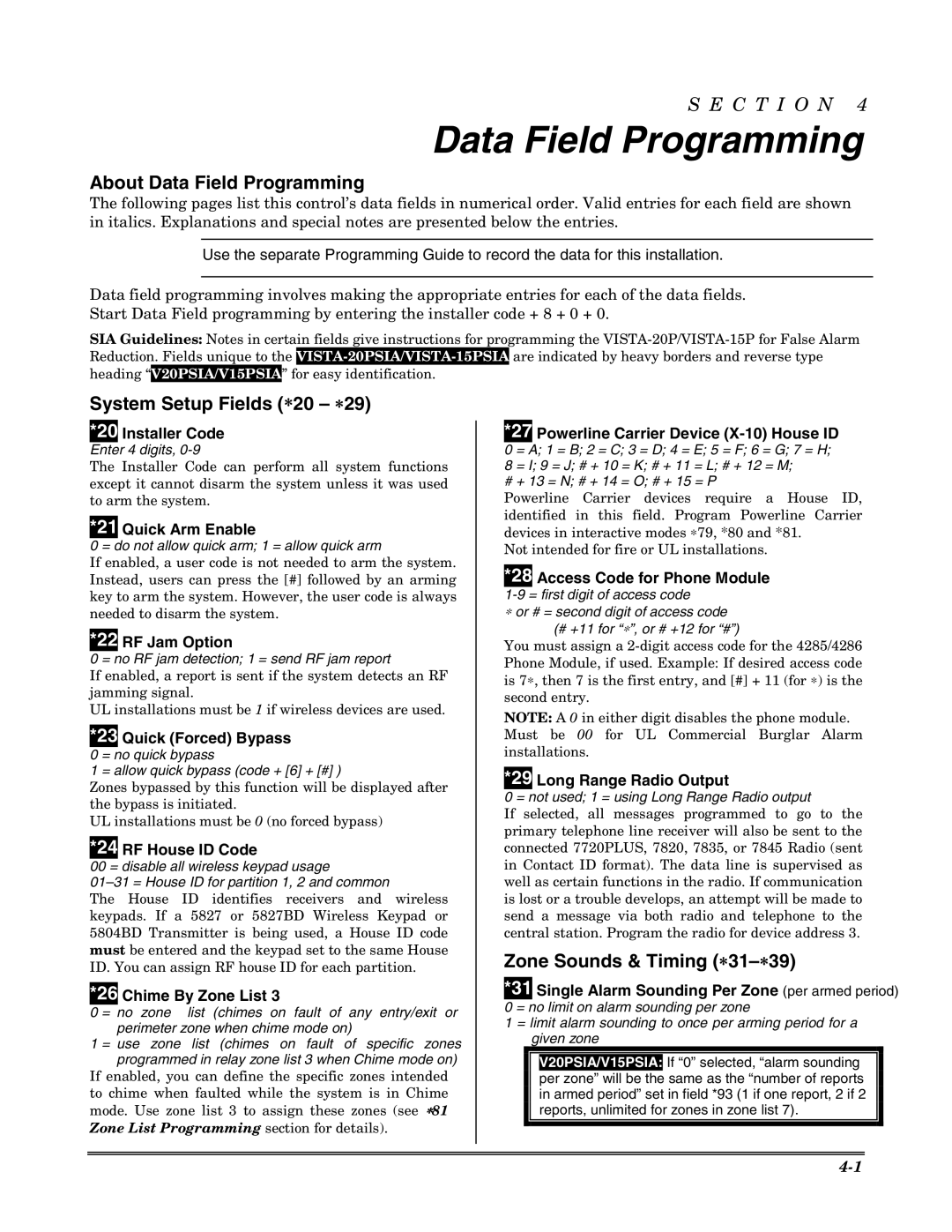
S E C T I O N 4
Data Field Programming
About Data Field Programming
The following pages list this control’s data fields in numerical order. Valid entries for each field are shown in italics. Explanations and special notes are presented below the entries.
Use the separate Programming Guide to record the data for this installation.
Data field programming involves making the appropriate entries for each of the data fields. Start Data Field programming by entering the installer code + 8 + 0 + 0.
SIA Guidelines: Notes in certain fields give instructions for programming the
System Setup Fields (∗20 – ∗29)
*20 Installer Code
Enter 4 digits, 0-9
The Installer Code can perform all system functions except it cannot disarm the system unless it was used to arm the system.
*21 Quick Arm Enable
0 = do not allow quick arm; 1 = allow quick arm
If enabled, a user code is not needed to arm the system. Instead, users can press the [#] followed by an arming key to arm the system. However, the user code is always needed to disarm the system.
*22 RF Jam Option
0 = no RF jam detection; 1 = send RF jam report
If enabled, a report is sent if the system detects an RF jamming signal.
UL installations must be 1 if wireless devices are used.
*23 Quick (Forced) Bypass
0 = no quick bypass
1 = allow quick bypass (code + [6] + [#] )
Zones bypassed by this function will be displayed after the bypass is initiated.
UL installations must be 0 (no forced bypass)
*24 RF House ID Code
00 = disable all wireless keypad usage
The House ID identifies receivers and wireless keypads. If a 5827 or 5827BD Wireless Keypad or 5804BD Transmitter is being used, a House ID code must be entered and the keypad set to the same House ID. You can assign RF house ID for each partition.
*26 Chime By Zone List 3
0 = | no zone list (chimes on fault of any entry/exit or |
| perimeter zone when chime mode on) |
1 = | use zone list (chimes on fault of specific zones |
| programmed in relay zone list 3 when Chime mode on) |
If enabled, you can define the specific zones intended to chime when faulted while the system is in Chime mode. Use zone list 3 to assign these zones (see ∗81 Zone List Programming section for details).
*27 Powerline Carrier Device (X-10) House ID
0 = A; 1 = B; 2 = C; 3 = D; 4 = E; 5 = F; 6 = G; 7 = H; 8 = I; 9 = J; # + 10 = K; # + 11 = L; # + 12 = M;
# + 13 = N; # + 14 = O; # + 15 = P
Powerline Carrier devices require a House ID, identified in this field. Program Powerline Carrier devices in interactive modes ∗79, *80 and *81.
Not intended for fire or UL installations.
*28 Access Code for Phone Module
∗or # = second digit of access code
(# +11 for “∗”, or # +12 for “#”)
You must assign a
NOTE: A 0 in either digit disables the phone module. Must be 00 for UL Commercial Burglar Alarm installations.
*29 Long Range Radio Output
0 = not used; 1 = using Long Range Radio output
If selected, all messages programmed to go to the primary telephone line receiver will also be sent to the connected 7720PLUS, 7820, 7835, or 7845 Radio (sent in Contact ID format). The data line is supervised as well as certain functions in the radio. If communication is lost or a trouble develops, an attempt will be made to send a message via both radio and telephone to the central station. Program the radio for device address 3.
Zone Sounds & Timing (∗31–∗39)
*31 Single Alarm Sounding Per Zone (per armed period)
0 = no limit on alarm sounding per zone
1 = limit alarm sounding to once per arming period for a given zone
V20PSIA/V15PSIA: If “0” selected, “alarm sounding per zone” will be the same as the “number of reports in armed period” set in field *93 (1 if one report, 2 if 2 reports, unlimited for zones in zone list 7).
